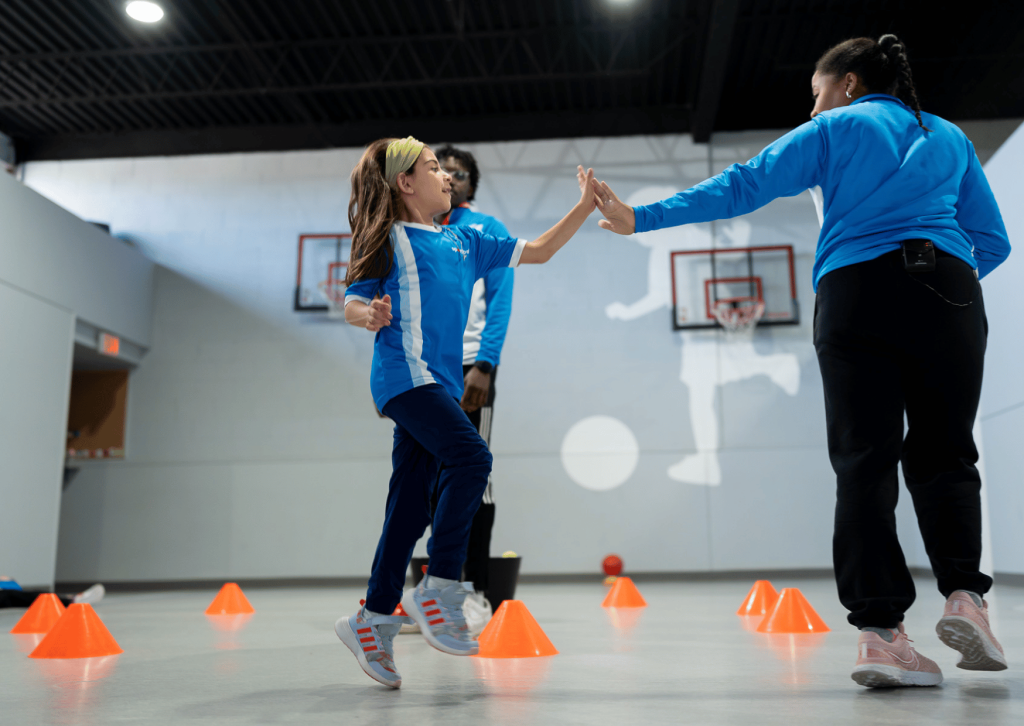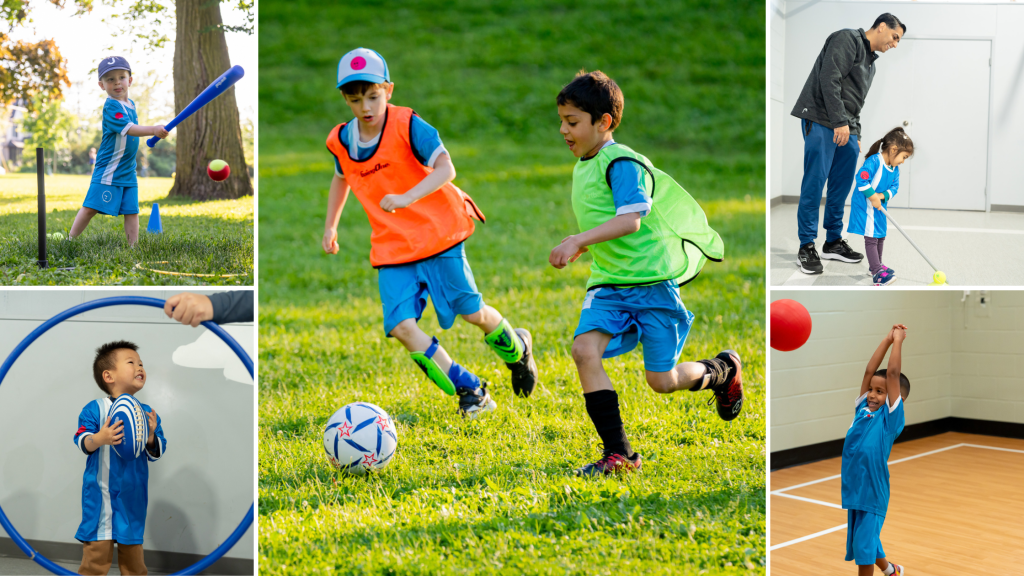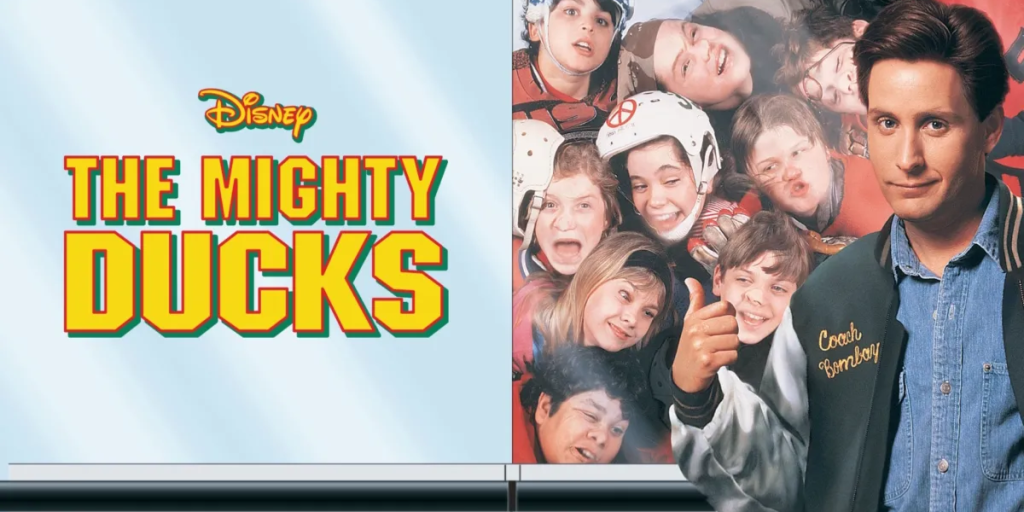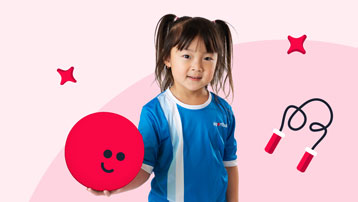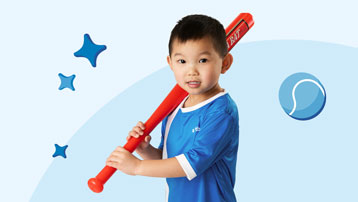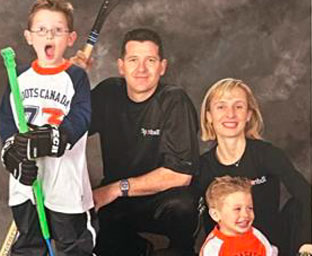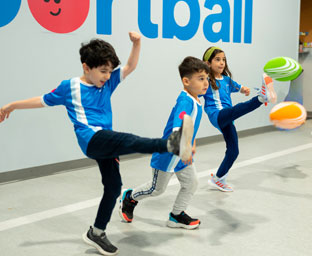If you’ve ever attended a Sportball program, you know how much fun we have in class – from “popcorn” to “rolling donuts” there’s never a dull moment! But take a deeper dive behind the scenes and you’ll see that there is a very scientific method to our madness.
We call it Coaching with Purpose.
At Sportball, “coaching with purpose” means that every moment in class—from warm-up to wrap-up—is intentionally designed to help children thrive. Our certified coaches follow a proven, consistent structure where fun and learning go hand in hand.
This pioneering approach ensures that each game, skill, activity, and instruction given in Sportball classes has an expected outcome. These outcomes include the acquisition of:
- Motor Skills
- Sport Skills
- Social Skills
How does coaching with purpose work in practice? By combining expert coaching, child-sized equipment, and research-backed progressions, Sportball helps children refine essential motor and sport skills while developing confidence, empathy, and teamwork. Parents often see these gains outside the gym too—whether it’s better focus at school, more patience during playdates, or a stronger “I can do it!” attitude at home. We break down these three skillsets below and outline how each outcome is intentionally targeted during a Sportball program.
Motor Skills
Motor skills are the building blocks of every movement—walking, running, kicking, throwing, or jumping—all of which contribute to your child’s growing Physical Literacy. Each Sportball class is designed with these milestones in mind, targeting specific skills that develop in sequence and grow stronger over time. For example, in a First Steps class for children 16 – 24 months old, toddlers might practice shooting a ball with two hands through a large vertical hoop. What looks like simple fun actually helps them refine important motor skills—grasping, swinging, throwing, and shooting—while also encouraging balance, coordination, and focus. These activities align with early developmental milestones, such as stooping and recovering, throwing at large targets, and pushing or pulling objects, all of which are key achievements at this stage (see Developmental Milestones for Parent & Child First Steps, 16–24 months).
As children grow, Sportball coaches gradually increase the challenge to match their new abilities. In later classes, a similar task might involve aiming a ball through a horizontal hoop, which demands greater precision, coordination, and timing. For children in our ABC’s of Sport (ages 2–3), that means catching large balls, kicking with more force, and running around obstacles—skills that reflect this age group’s growing coordination and body awareness. By the Fundamentals stage (ages 3–6), children are hopping, skipping, balancing, and dribbling with intention, laying the foundation for advanced sport-specific skills later on.
At every level, Sportball’s proven “refine, rehearse, repeat” approach helps children build mastery step by step. Classes follow a predictable routine—warm-up, skill practice, then gameplay—because kids learn best when they know what to expect. Equipment is always age-appropriate and kid-sized, and coaches use a blend of visual cues, key words, and demonstrations to meet each child at their developmental stage. This thoughtful structure ensures every child feels challenged but capable, setting them up for success both on and off the field.
Ultimately, progressive skill development isn’t just about learning to kick or throw—it’s about building confidence through accomplishment. Each new milestone achieved helps children see themselves as capable movers and problem-solvers, fueling motivation to keep trying, keep playing, and keep growing.

Sport Skills
At Sportball, our multi-sport programs give kids the chance to learn the basics of eight different sports — soccer, baseball, basketball, football, hockey, volleyball, golf, and tennis. Each class focuses on one sport at a time, introducing key skills through fun, age-appropriate activities that build confidence and coordination. Research shows that letting kids try a variety of sports early on helps them become stronger, more coordinated, and more confident movers. According to Nationwide Children’s Hospital, every sport “challenges the body in different ways,” and those skills “carry over into other sports,” helping kids become well-rounded athletes.
The American Academy of Pediatrics (AAP) agrees that young children—especially under six—learn best through active play, not strict drills. Running, jumping, climbing, and exploring are how kids naturally build balance, strength, and coordination. In other words, before children can master sport-specific skills, they need time to move, play, and explore in lots of different ways.
By rotating through multiple sports, Sportball gives kids exactly that. It’s a developmentally balanced way to build core motor skills while keeping things fun and engaging. It also helps prevent the overuse injuries and burnout that can come from focusing on just one sport too early—something Sport Manitoba warns has become increasingly common in youth sports today.

Social Skills
Finally, each skill and task in a Sportball class is associated with a specific social skill. When dribbling a basketball in the above example, children are taught the importance of following instructions from a coach, focusing, waiting in line and taking turns. As children progress in age and experience, Sportball coaches emphasize the need to work with others as a team, exhibit leadership skills, and how to navigate feelings around winning and losing. We like to think of ourselves as part of your village, helping you to raise confident and competent little humans who are set up to thrive.
Research shows that early social interactions and responsive relationships play a critical role in shaping a child’s confidence, emotional regulation, and ability to connect with others. Child psychiatrist Dr. Jean Clinton explains that when kids feel safe, supported, and connected, their brains are primed for learning and growth. Programs like Sportball—where kids are encouraged to share, cooperate, and problem-solve through purposeful play—build these very foundations. Over time, those moments of teamwork, encouragement, and perseverance become the building blocks of resilience and social-emotional strength.
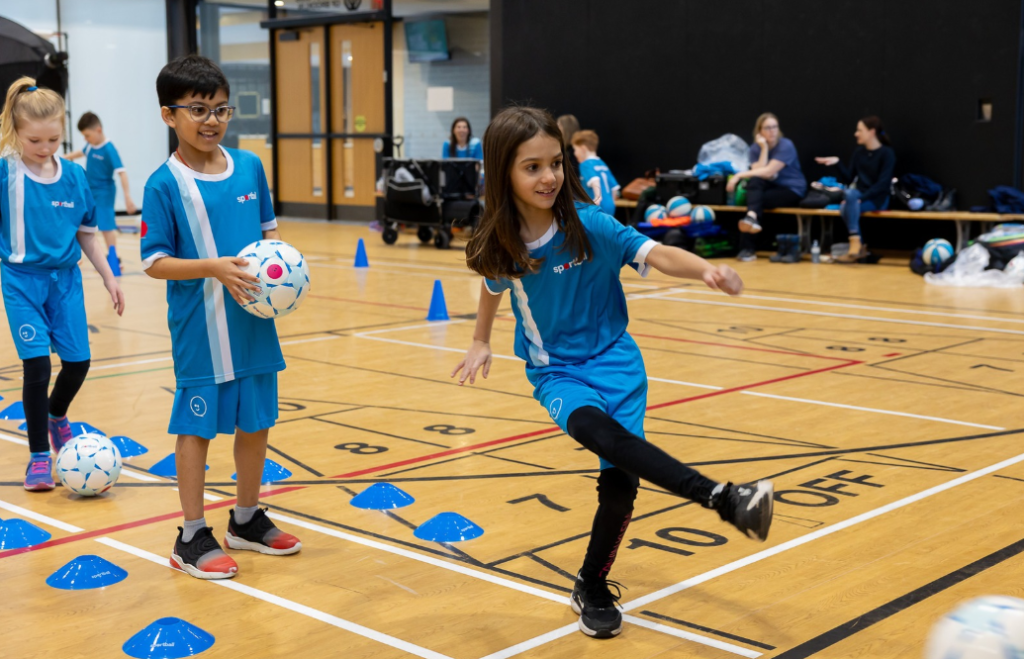
Collectively, the social, motor, and sport-specific skills that kids gain through progressive Sportball classes give them foundational skills for life that go well beyond the gym or field. This carefully developed program structure also ensures that your little athletes are continuously building their confidence through mastery of skills and having a blast too!
Research supports this approach. Experts like Dr. Carol Dweck highlight that when children believe they can improve with effort—a concept called growth mindset—they’re more motivated, resilient, and confident when facing challenges. Sportball coaches nurture this mindset by celebrating effort and persistence, not just outcomes. This helps kids see mistakes as opportunities to learn, rather than setbacks. Similarly, mastery learning, as described by educator Sal Khan, reinforces progress at each child’s own pace, ensuring genuine skill development before moving on. Combined with Sportball’s focus on fun, non-competitive environments, this approach builds both competence and confidence—key predictors of long-term well-being and success.
Physical literacy research also shows that early active play supports not only coordination and strength, but also focus, problem-solving, and school readiness. That’s why our programs are designed to meet children where they are developmentally—offering the right balance of challenge, encouragement, and joy to keep them growing both physically and emotionally.
Read more on building confidence and social skills through play: How we build confidence & social skills in kids
Join us for a purposeful and sporty adventure. Find your closest Sportball location today!
FAQ
1. What is “Coaching with Purpose”?
It’s a research-backed approach where every activity is intentionally designed to build motor, sport, and social skills—balancing fun with meaningful development.
2. Why is multi-sport beneficial?
Trying many sports early builds coordination, confidence, and physical literacy while reducing injury risk and preventing burnout from early specialization.
3. How does Sportball help build confidence and social skills?
Coaches encourage teamwork, effort, and persistence, helping kids practice sharing, turn-taking, and managing emotions while developing a growth mindset.
References
American Academy of Pediatrics. (2019, May 20). American Academy of Pediatrics encourages organized sports – For the fun of it. HealthyChildren.org. Retrieved August 12, 2025, from https://www.healthychildren.org/English/news/Pages/AAP-Encourages-Organized-Sports.aspx
Clinton, J. (2025, June). Strong Educators, Strong Foundations – with Dr. Jean Clinton. YouTube. https://youtu.be/2FWGw8DX7ZE?si=xh2OqIN61F5UzKwx
Dweck, C. (2014, October 9). Developing a Growth Mindset with Carol Dweck. YouTube. https://youtu.be/hiiEeMN7vbQ?si=Ai2AQ0l51ybLzszW
Kautz, J. (2022, March 25). To raise a better athlete, don’t specialize: Young athletes get more benefits from multiple sports, health research shows. Sanford Health News. Retrieved August 12, 2025, from https://news.sanfordhealth.org/sports-medicine/multi-sport-vs-single-sport/
Khan Academy. (2023, August 9). Why mastery learning, by Sal Khan. Khan Academy Help Center. Retrieved August 12, 2025, from https://support.khanacademy.org/hc/en-us/articles/360030753412-Why-Mastery-Learning-by-Sal-Khan
Nationwide Children’s Hospital. (n.d.). Single-sport or multi-sport participation: What’s best for my child? In Sports and Orthopedic Physical Therapy—Resources. Retrieved August 12, 2025, from https://www.nationwidechildrens.org/specialties/physical-therapy-sports-and-orthopedic/resources/single-sport-multi-sport
Sport Manitoba. (2025). Sports specialization and intensive training in young athletes. Retrieved September 9, 2025, from https://www.sportmanitoba.ca/resources/sports-specialization-and-intensive-training-in-young-athletes
Ronda Robinson is the Product Team Lead and a Mentor Coach at Sportball for the last 4 years. She is a recent graduate with a Master of Arts in Child Study and Education from University of Toronto. Ronda has a passion for designing curriculum and writing on childhood resilience.

